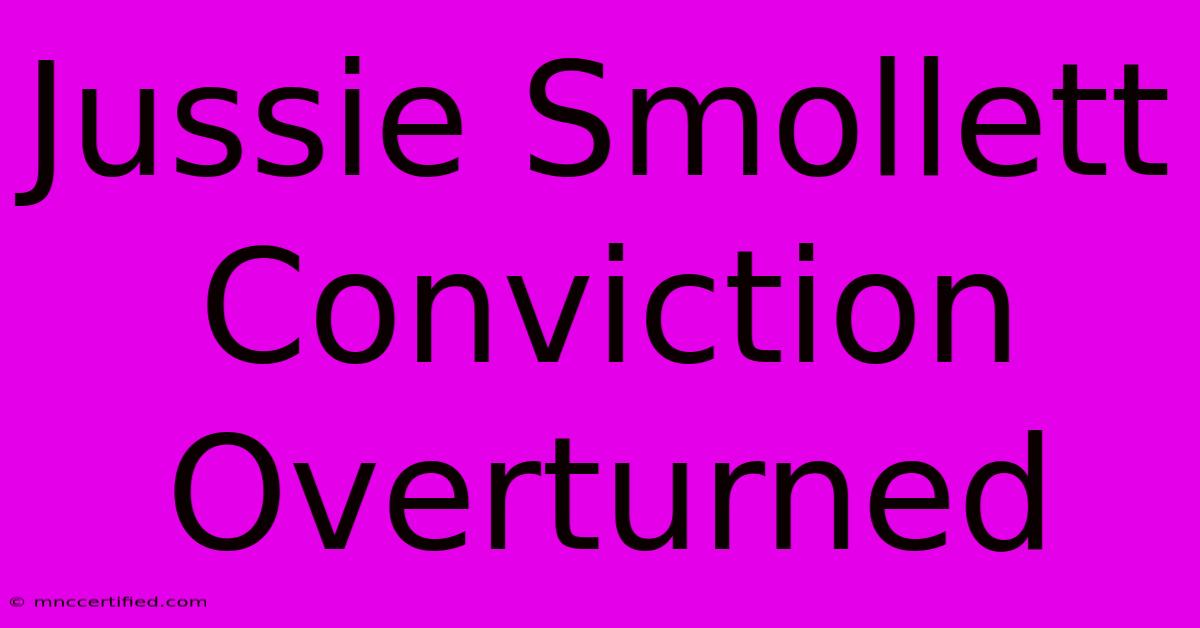Jussie Smollett Conviction Overturned

Table of Contents
Jussie Smollett Conviction Overturned: A Deeper Look at the Case
The case of Jussie Smollett, the actor who claimed to be the victim of a hate crime, has taken several dramatic turns. His initial conviction was overturned, sparking widespread debate and raising crucial questions about the justice system. This article will delve into the details of the case, the reasons behind the overturned conviction, and the lasting implications.
The Initial Charges and Conviction
In 2019, Smollett, known for his role in the television show Empire, reported a brutal attack in Chicago, claiming he was assaulted by two men who shouted racial and homophobic slurs before pouring bleach on him and placing a noose around his neck. This incident immediately sparked national outrage and intense media scrutiny. However, police investigations revealed inconsistencies in Smollett's account. He was subsequently charged with disorderly conduct for filing a false police report – a felony in Illinois. After a highly publicized trial, Smollett was found guilty on five of the six counts and sentenced to 150 days in jail, along with probation and fines.
Key Points of the Initial Trial:
- Inconsistencies in Smollett's Story: The prosecution successfully presented evidence highlighting discrepancies between Smollett's initial statements and the findings of the police investigation.
- Brothers' Testimony: The testimony of the brothers who allegedly staged the attack played a crucial role in the prosecution's case.
- Financial Motive Allegations: The prosecution argued that Smollett orchestrated the incident to advance his career and garner public sympathy.
The Overturning of the Conviction
In March 2022, a significant development occurred when a judge overturned Smollett's conviction. This decision was based on the argument that the special prosecutor assigned to the case, Dan Webb, lacked the authority to bring charges against Smollett. The judge ruled that the initial appointment of Webb was flawed, casting doubt on the legitimacy of the entire process.
The Legal Reasoning Behind the Overturning:
- Questionable Appointment of Special Prosecutor: The central argument for the overturned conviction hinges on the legality of Webb's appointment. The judge determined that the process didn't adhere to proper legal procedure.
- Due Process Concerns: The defense argued, and the judge seemingly agreed, that the irregularities in the appointment of the special prosecutor violated Smollett's due process rights.
- Impact on Future Cases: This decision has significant ramifications for future cases, raising questions about the standards for appointing special prosecutors and the potential for similar challenges to convictions.
The Aftermath and Public Reaction
The overturning of Smollett's conviction sparked a wave of mixed reactions. While some hailed the decision as a victory for due process, others criticized it as a miscarriage of justice, arguing that it undermined the seriousness of hate crimes and the importance of holding individuals accountable for false reporting. The case continues to fuel discussions about race, justice, and the complexities of the legal system.
Ongoing Debates and Implications:
- The Importance of Due Process: The case highlights the critical importance of adhering to proper legal procedures in criminal prosecutions.
- Public Perception of Hate Crimes: The controversy surrounding Smollett's case has undoubtedly impacted public perception and trust surrounding claims of hate crimes.
- The Role of the Media: The intense media coverage surrounding the case underscores the significant influence of the media on public opinion and the justice system.
Conclusion: A Case Study in Legal Complexity
The Jussie Smollett case remains a complex and controversial legal saga. The overturning of his conviction, while raising significant concerns about due process, also leaves many questions unanswered. It serves as a crucial case study highlighting the intricate interplay between law, media, public opinion, and the pursuit of justice. Further analysis is needed to fully grasp the long-term implications of this landmark decision. The case will undoubtedly continue to be studied and debated within legal and public spheres for years to come.

Thank you for visiting our website wich cover about Jussie Smollett Conviction Overturned. We hope the information provided has been useful to you. Feel free to contact us if you have any questions or need further assistance. See you next time and dont miss to bookmark.
Featured Posts
-
Understanding The Iccs Jurisdiction
Nov 22, 2024
-
Explore Penn States Impact Map
Nov 22, 2024
-
Nc Farm Bureau Insurance Reviews
Nov 22, 2024
-
Jelly Roll Plays Pickup Basketball
Nov 22, 2024
-
16 Foot Box Truck Insurance Cost
Nov 22, 2024